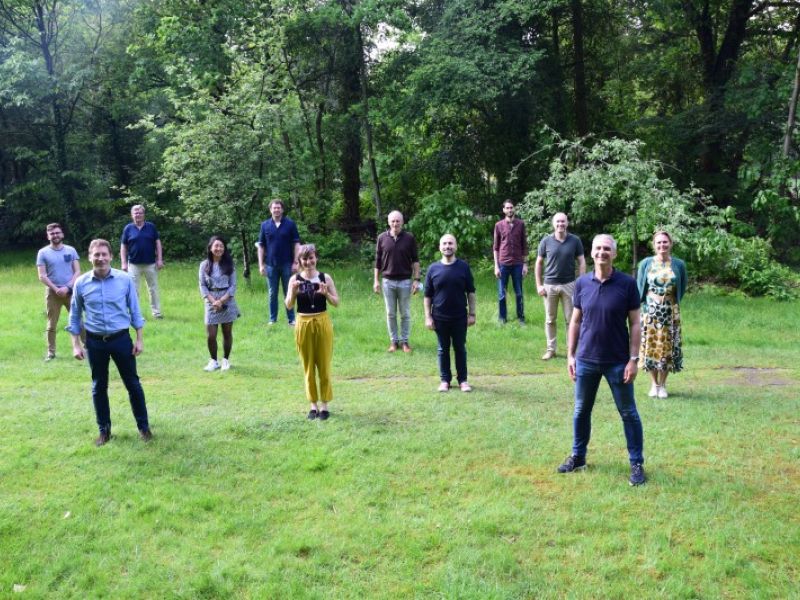During the intensive bootcamps the teams received professional guidance from experienced coaches Math Kohnen and Chretien Herben. Next to this the teams learned from the expertise of investors, seasoned entrepreneurs and industry experts. But who are these teams participating in the summer and fall edition?
Summer
The selected teams are Sella Therapies (LUMC), Astherna (Radboud UMC), VivArt-X (TU Eindhoven), Inasol Biotech and Orgonex (both Utrecht University). Central to all propositions are technological innovations aimed at improving healthcare. These range from hormone modulation for pain management to the use of RNA therapy for the treatment of Stargardt disease or a bioreactor for fast and cost-effective large-scale expansion of organoids.
Sella Therapies
Originating form the Academic Medical Center in Leiden, Sella Therapies is working on a technology to relieve pain in a natural way through hormone modulation with bioelectronics. For them, it is all about building the dream. Although the idea to begin a startup already started 4 years ago, the momentum is now. “The Venture Challenge allows us to really focus on the venture and work together.”
Astherna
Atherna uses RNA-therapy for the treatment of Stargardt disease, which is the most common form of blindness in later life. This new team, originating from Radboud UMC, learns to work together and have the time to actively work on their proposition. “The Venture Challenge motivates us to speed up the process”, the team says.
Orgonex
Research using organoids is booming! But how can we make it more efficient? With this goal in mind, Orgonex developed the Orgonex Bioreactor, a robust and cost-effective small-scale bioreactor suitable for expansion and differentiation of organoids. The Venture Challenge helps them with the next step: “We want to explore what the best way is to bring our product to the market and make it accessible to a large range of customers.”
VivArt-x
The feedback, coaching and mentorship is a nice jumping start for VivArt-x, a startup which develops synthetic biomaterial for cell culture and cell therapies. Unique herein is the provision of customised, tailor-made material for specific applications in the lab. “It is great to work together with other startups! Because we all have similar feedback, we can really understand and help each other.”
Inasol Biotech
In the currently used diagnostic assays for certain types of Influenza virus, more and more problems occur due to the virus involving. Thus, it is time for a new reagent in this assay and fix the problems, and this is exactly what Inasol Biotech aims to do. Apart from the feedback from the professionals and the other startups, Inasol Biotech names another great advantage of the Venture Challenge: “We can establish the initial contact with investors.”
Fall
The selected teams are Monoceros Analytics, Ardim, Encytos, Stroke Pointer and Purecyte. Central to all propositions are technological innovations aimed at improving healthcare. These range from a new method to identify cancer cells in the blood to a hat that can measure brain waves to identify the severe stroke patients.
Monoceros Analytics
The goal of Monoceros Analyitcs is to provide a one-step-service to pharma companies to identify the most successful molecules at a early stage. These molecules can be used for instances for new medicines. “The Venture Challenge is really interesting,” says the team. “It is valuable to understand the market better and get a grip on the needs of our clients.”
Ardim
Care at the right place is an important pillar for Ardim. This team works on bringing medical imaging closer to patients with the help of artificial intelligence. An example is echography for babies with possible hip dysplasia. Now, every baby needs to get checked in the hospital, but Ardim works on a smaller echo device that can be used in child consultancy bureaus. The data from the echography than is compared to a database.
Encytos
Encytos offers a cell growth platform of inorganic material which allows 3D cell culture as easy as 2D. This method helps cells to differentiate much faster. More information can be found on their website: encytos.com. “During the Venture Challenge, we identified that our company needs different skills,” says the team. “We now understand the market better and are ready to start networking.”
Stroke Pointer
The first choice in treatment for stroke patients is very important for the recovery. In order to help ambulance personnel make the right decision for triage, Stroke Pointer has designed a hat that can measure brain waves (EEG) to identify the severe stroke patients in order to bring them to the right hospital for treatment. “The Venture Challenge helps us focus and forces us to think about why our idea is the best,” says the team.
Purecyte
Purecyte developed a microfluidic platform which can identify tumor cells in the blood. These cells are markers of metastasis and give for instance valuable insights on whether a treatment works or not. The team praises the Venture Challenge for its interactivity and the interesting speakers. “Sirius Medical, a Venture Challenge alumnus talked about their experiences,” says the team. “Their journey and story was very relatable for us.”
And the winner is…
In two 3-day workshops, the facilitators and other ‘competing’ teams challenge the teams to focus their business idea to create optimal customer value, and the teams learn to pitch their business case. At the end of the Challenge, the team with the best venture plan and pitch will be awarded € 25,000.00. For both the summer and fall edition, a winner will be announced during the Dutch Life Sciences Conference on 25 November.


